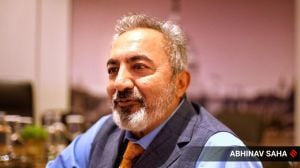Phantom of the Opera
IT began as a mild buzz but is beginning to acquire a momentum of its own. After the initial shock and disbelief, the BJP and its allies in ...

IT began as a mild buzz but is beginning to acquire a momentum of its own. After the initial shock and disbelief, the BJP and its allies in the NDA are deep in post mortem mode, analysing the reasons for defeat in the 14th Lok Sabha election.
A theory that is beginning to gain ground is that, far from being netural or fragmented, the Muslim vote quietly consolidated at the constituency level to defeat the NDA candidate. This hurt the BJP, of course — but it also hurt those NDA allies hitherto not seen as hostile by Muslims; or those like the Shiv Sena, banking on a split in the Muslim vote.
There is a perception that this was a delayed backlash to the Gujarat riots of 2002. In a sense Narendra Modi was the Phantom of the Opera, the spectre who haunted this election. It would be too much to say the Muslim vote completely swung the contest, but, certainly, its determined resolve to bring in a new government threw the NDA’s calculations awry.
In Bengal, a film that told a tragedy
IS this theory borne out by facts? In West Bengal, it would certainly seem so. For the ruling CPI(M), the Lok Sabha battle actually began in August 2003 when it sponsored the relocation of Kutubuddin Ansari — the most publicised face of the Gujarat violence, his terrified expression, begging for his life, was an image that flew across the world.
Ansari was rehabilitated in a predominantly Muslim area of Tiljala, eastern Kolkata. It was a powerful act of political symbolism by the Marxists — Modi’s Gujarat was a dangerous place for people like Ansari but Bengal was a safe haven. This marked the beginning of a sustained campaign that reached its climax during the Lok Sabha election.
The SFI, sutdents’ wing of the CPI(M), commissioned a film titled Nothing Official as part of its poll campaign. It featured the Gujarat riots — the Shah Alam refugee camp, Best Bakery carnage site, burning Muslim homes, aggressive Bajrang Dal activists. The documentary was shown across the state, mostly in Muslim-dominated areas.
‘‘The production on the Gujarat riots by the CPI(M) did not have the Godhra episode,’’ complains Tapan Sikdar (BJP), unseated as MP from Dum Dum. ‘‘I repeatedly complained to the Election Commission about the film with communal overtones … But there was no action.’’
In two assembly segments — Kamarhati and Khardah — with a large Muslim population, Sikdar trailed badly. In 1999, he had led by 6,000 and 12,000 votes respectively. This time he was behind the CPI(M) by 21,000 and 28,000 votes.
Satyabrata Mukherjee (BJP) was unseated in Krishnanagar. He tells an identical story of reverses in Muslim pockets such as the Palashipara and Chapra assembly segments. The Gujarat film was shown extensively in Krishnagar.
|
MAMATA BANERJEE
|
|||||
|
|
|||||
| Trinamool Congress Got wiped out in even party’s Kolkata bastion thanks to reverses in Muslim segments |
|||||
For the Trinamool, the ‘‘Modi factor’’ came into play in Barasat, Jadvapur, Kolkata North East and Kolkata North West, all seats it was defending. All four seats within greater Kolkata were lost. The results show the same pattern of heavy deficits for Trinamool candidates in assembly segments with a large Muslim electorate.
PARTY candidate Sougata Roy in Diamond Harbour was among those meted out shock treatment by minority voters. He openly blames the ‘‘Gujarat factor’’. In just two segments of Garden Reach and Maheshtala — where Muslim voters are in a majority — Roy trailed by 85,000 votes.
Abdur Razzak Mollah, a CPI(M) minister, notes a pattern. In urban areas, the Muslims chose the CPI(M)-Left. But in a stretch of central Bengal, covering Malda, Murshidabad and parts of Dinajpur, where the Congress is formidable, Muslims voted for Sonia Gandhi’s party. Four out of the five Congress MPs are from this belt.
‘‘There was a new realisation among Muslim voters,’’ says Mollah, ‘‘the age of diktats and fatwas is over. Muslims voted intelligently, knowing who is a friend and who is not.’’
|
|
|||||
| JD(U) Nitish and Sharad Yadav had some personal appeal among Muslims in 1999. Not this times |
|||||
As for Bihar, a minority veto for the NDA
“GUJARAT should not have happened,’’ Atal Behari Vajpayee apologised to Muslims in Kishenganj, towards the end of campaign. ‘‘Muslims should give BJP a chance,’’ he pleaded for the local candidate, Shahnawaz Husain. But the constituency, 65 per cent Muslim, elected Taslimuddin of the RJD.
Muslims of Bihar had turned indifferent to Laloo Yadav’s promise of a ‘‘riot-free’’ government — the last big riot in Bihar was in Bhagalpur, 15 years ago. Though Laloo never feared Muslims would move away, he was worried about turnout. However, at the end of a campaign charged with gory images of the Gujarat riots, Muslims queued up behind the BJP’s closest rival.
In the process, the JD(U), the BJP’s partner, hurt the most. ‘‘Gujarat riots were the single most important reason for our failure,’’ JD(U) leader Nitish Kumar confessed. The NDA was defending 29 of Bihar’s 40 seats; it stands reduced to 11.
IN Kishenganj, Husain’s surprise victory in 1999, by 8,000 votes, was due to a third candidate. The spiritual leader of Surjapuri Muslims, Maulana Asrarul Haque polled nearly two lakh votes. This time, the Maulana withdrew from the contest and threw his weight behind Taslimuddin.
In Motihari and Gopalganj, the BJP and JD(U) calculated Muslims were angry with the RJD because of the police action in 2003 against Siwan MP Mohammed Shahabuddin. But RJD candidates romped home, defeating sitting NDA MPs.
Equally telling is the example of another Muslim candidate of the BJP, Mohammed Anwarul Haque (Sheohar). Haque had won here in 1999 as an RJD candidate. This time he lost.
IN two crucial constituencies, Muslim votes were split. Tariq Anwar (NCP) lost in Katihar by a mere 3,000 votes, with an SP-backed Congress rebel, Mobarak Hussain, taking 37,000 votes. In Bhagalpur, the SP’s Pervez Khan polled more than one lakh votes, facilitating the BJP’s victory.
JD(U) candidates such as Nitish Kumar and Sharad Yadav had managed to get some Muslim votes in 1999. This time, a quiet determination to redress the wrongs of Gujarat worked to defeat Sharad in Madhepura and Nitish in Barh. The JD(U) came down to six seats from 16.
|
JAYALALITHAA
|
|||||
|
|
|||||
| AIADMK In Amma borough Periyakulam, her foster son Dinakaran lost to a Muslim Congressman |
|||||
Amma country. And the perils of soft Hindutva
IF Narendra Modi picked a lesson or two on Hindutva from anyone, it was from Tamil Nadu’s Amma. Jayalalithaa’s logic was simple: if Modi could play the aggressive Hindutva card in Gujarat and win a second term, so could she.
But the calculations went for a toss in the Lok Sabha election. Her party lost even Periyakulam, where her pocket borough, Andipatti, lies. Quite significantly, Periyakulam has a sizeable presence of Muslim voters. And it was a Muslim candidate, J.M. Haroon of the Congress, who defeated T.T.V. Dinakaran, nephew of Jayalalithaa’s close friend, Sasikala.
ELECTION 2004 saw an unprecedented Muslim consolidation against the AIADMK-BJP alliance. Muslims make up six to eight per cent of the electorate. In eight of 39 constituencies, the Muslim vote is between 1.5 lakhs and two lakhs.
Take Tirupattur, the constituency with perhaps the largest Muslim presence. The DMK won it by about 30,000 votes in 1999, as a BJP ally, but retained it this time by 1.8 lakh votes — a 20 per cent swing.
“IN a way, the Gujarat carnage was a turning point in Tamil Nadu politics. It exposed Jayalalithaa’s Hindutva leanings,’’ says IUML leader Khader Moideen, who won from substantially-Muslim Vellore on a DMK ticket. In his campaign, Moideen spoke of Gujarat.
The Tamil Muslim Munnetra Kazhagam (TMMK) distributed pamphlets featuring a picture of Jayalalithaa at the swearing-in of Modi in December 2002. ‘‘We told the Muslims that Jayalalithaa’s regime was a BJP rule by proxy,’’ says TMMK leader Jawaharullah.
|
|
|||||
| Telugu Desam Strategic alliance between Congress and Majlis split Hindu vote but united Muslim vote |
|||||
Hyderabad blues for Cyberabad saffron
“THE Gujarat riots did change the voting pattern of the Muslims in Andhra Pradesh. The middle class and upper middle class Muslims, who normally do not vote, came out in big numbers,’’ says Asaduddin Owaisi, the leader of the Majlis-e-Ittehaadul Muslimeen party (MIM).
Owaisi may just be right. Not merely because he won from Hyderabad, defeating the BJP by one lakh votes.
The rout of the TDP and its junior ally, the BJP, does tell a story of Muslim consolidation. The fury of the farmers and the fierce anti-incumbency against the N. Chandrababu regime apart, the verdict was also possibly scripted by average Muslim voters — they’re 12 million of them, a fifth of the state’s electorate — who distanced themselves from their once-favourite party, the TDP.
AFTER the Gujarat carnage, the Left parties realised the need to move closer to the Congress. And the Majlis, formerly an ally of the TDP, entered into a tacit tie-up with the Congress. The Congress fielded weak candidates in the Hyderabad parliamentary seat and a few assembly constituencies, where the Majlis had a winning chance. The idea was to divide the Hindu vote.
The Majlis returned the favour by not fielding candidates in most of the parliamentary constituencies to ensure the Muslim votes went en bloc to the Congress and its allies.
The result: the Congress and its allies retained the Muslim-dominant parliamentary constituencies comfortably. For instance, Chief Minister Y.S. Rajasekhar Reddy’s brother, Y.S. Vivekananda Reddy, won from Cuddapah by just 20,000 votes in 1999. This time, he won by over one lakh votes.
|
BAL THACKERAY
|
|||||
|
|
|||||
| Shiv Sena Of Maharashtra’s 288 assembly segments, Muslim vote swings 56. BJP-Shiv Sena lost all 56 |
|||||
Defanging the tiger in its Maharashtra den
ON the face of it, Maharashtra was their face-saver — with 25 of the 48 parliamentary seats in the saffron kitty and voteshare curving up gently, from 38 per cent in 1999 to 45 per cent in 2004.
But to shake off the pixels on the bigger picture, walk through teeming, minaret-studded Umerkhadi in South Mumbai or visit the depressed, riot-prone mill town of Malegaon, some 350 km north of Mumbai.
In fact, the Shiv Sena-BJP combine’s target was 33 seats. ‘‘We fell embarassingly short,’’ says a senior Sena leader. ‘‘Blame it on Gujarat.’’
The Sena has even conducted a survey to explain away the verdict. If it is to be believed, of Maharashtra’s 16.72 per cent Muslim vote share, the BJP polled only two per cent. The Sena netted seven per cent.
• Of the 288 assembly segments in the state, Muslims swing the vote in approximately 56. And in each of these 56 segments — in areas like Osmanabad, Beed, Aurangabad, Nanded, Parbhani and Latur— the saffron combine was shown the door, by a thumping majority.
• Roughly, of the 21,730 booths in urban Maharashtra, the saffron combine fared dismally at over 4,000 booths, mostly dominated by the minorities.
• Take the largely Muslim Umerkhadi segment. Here, first-time Congress contestant Milind Deora turned bookies’ favourite and then sitting BJP MP Jaywantiben Mehta into a minnow. He polled 29,543 votes. Mehta managed 8,224.
• In the Malegaon Lok Sabha constituency, sitting Janata(S) MP Haribhau Mahale lost to H.D. Chavan (BJP). But in the Malegaon assembly segment, Mahale polled 80,767 votes against Chavan’s 18,000.
FOR his part, Shiv Sena executive president Uddhav Thackeray declines to elaborate on his earlier contention that the Gujarat factor did them in. But senior party leaders point a finger in the general direction of Narendra Modi.
On counting day, when defeat was staring Sena contestant Sanjay Nirupam in the face, he did some serious Muslim bashing. ‘‘I extended a hand of friendship to them and they rejected it. They’re forcing us to implement our Hindutva agenda with a vengeance,’’ Nirupam said, adding Muslim leaders of the Mumbai North-West constituency had opposed his inviting Modi to campaign for him.
‘‘The Gujarati Muslims had decided to vote against the BJP. In the bargain, the Sena suffered,’’ was Nirupam’s explanation of his defeat to Sunil Dutt.
That leaves only one person who hasn’t spoken — Narendra Modi.
— , , ,
and
Photos



- 01
- 02
- 03
- 04
- 05




























